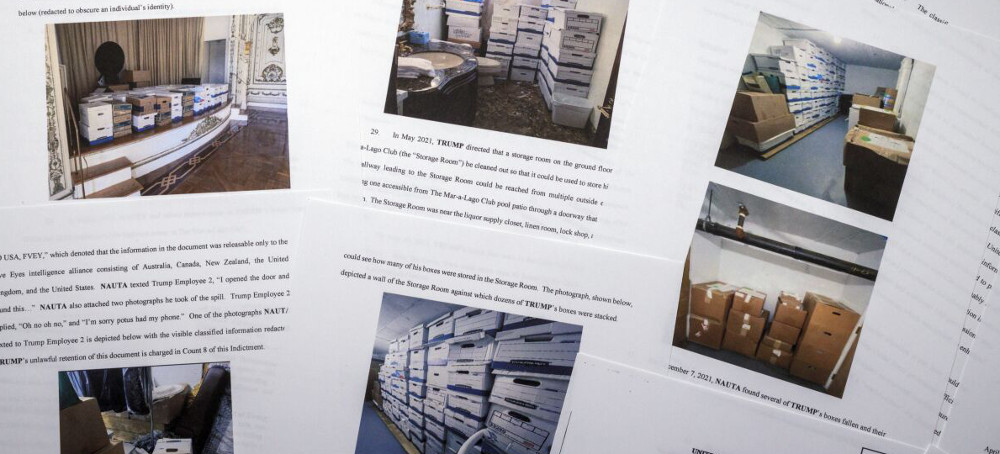Live on the homepage now!
Reader Supported News
For Trump, it will be irrelevant that the 106-year-old Espionage Act does not allow defendants to testify about why they handled classified documents the way they did. But, if not for that restriction, Hale might never have gone to prison in the first place.
Any attempt by Trump to present a “public interest” defense would be laughed out of court. Every indication is that his only interest was self. His intent could hardly be exculpatory.
In sharp contrast, a public-interest defense by Hale, if it had been allowed, might have swayed a jury. Such an argument in court — along the lines of what’s known as a “competing harms” defense — is akin to the claim that breaking into a house with a posted “No Trespassing” sign was justified to rescue children from a fire.
Hale’s decision to provide classified documents to an American media outlet was based on the need to inform the American people about what the military drone program was doing with their tax dollars in their names. The classified information from Hale enabled the website The Intercept to publish a series of articles in October 2015 that illuminated a hidden corner of U.S. foreign policy.
“The White House and Pentagon boast that the targeted killing program is precise and that civilian deaths are minimal,” one of the pieces reported. “However, documents detailing a special operations campaign in northeastern Afghanistan, Operation Haymaker, show that between January 2012 and February 2013, U.S. special operations airstrikes killed more than 200 people. Of those, only 35 were the intended targets. During one five-month period of the operation, according to the documents, nearly 90 percent of the people killed in airstrikes were not the intended targets.”
To truly have the informed consent of the governed, providing such information was a vital public service. But with Hale’s actual purpose excluded from his trial, the Justice Department’s prosecution was a slam dunk.
At his sentencing two years ago, Hale gave a handwritten five-page letter to the judge, who was about to sentence him to several years in prison. Hale wrote that he had given documents to the press, “not one more nor one less than necessary, to dispel the demonstrable lie that said drone warfare kept us safe, that our lives are worth more than theirs, and that only more killing would bring about certain victory. Simply put: It is wrong to kill, it is especially wrong to kill the defenseless, and it is an abdication of the Bill of Rights to kill without due process of law.”
Hale, who traces his ancestry to the Revolutionary War hero Nathan Hale (executed by the British in 1776), is now confined to the heavily restrictive Communications Management Unit at the high-security Marion federal prison in Illinois. Rest assured that if Donald Trump is convicted of any of the felony counts in the federal indictment, he will have much less repressive prison accommodations.
As I write in my new book, “War Made Invisible”, which includes profiles of Daniel Hale and other whistleblowers, “My conversations with drone whistleblowers left me thinking about the huge gaps between how war ‘issues’ are commonly discussed in the United States and what they actually mean for actual people.”
It was Daniel Hale’s deep concern about what drone warfare actually means for actual people that impelled him to become a whistleblower. That’s why he’s in prison right now.
While Donald Trump is now facing prosecution on 37 felony counts — 31 of them for alleged Espionage Act violations — the contrast between his motivations and those of Daniel Hale will be excluded from the judicial proceedings. But the contrast should loom large in the court of public opinion.
When I asked a former top National Security Agency official, Thomas Drake, to compare the Trump and Hale cases, he said: “There are so many secrets in government and Trump saw some of the highest that existed. But based on the vast number he purloined, he clearly viewed them as having great material value as keepsakes to hoard, share and use for his own grift.” Drake added that Trump “did not keep those highly sensitive secrets to share in the public interest like a whistleblower, but for self-interest and personal pursuits.”
Drake, who worked at high levels of the NSA in the immediate aftermath of 9/11, is himself a whistleblower. (Full disclosure: A nonprofit that I help lead has supported Drake and distributed his essays.) He was ultimately vindicated following protracted prosecution, after going through government channels to no avail — and then providing information to a Baltimore Sun reporter — to reveal huge waste and mass surveillance by the agency in systematic violation of the Fourth Amendment’s privacy protections.
“Donald Trump did not faithfully defend or execute the laws of the land — instead he held them, and ‘We the People’ of the U.S., in utter contempt,” Drake said. “Daniel Hale held faith to the highest ideals of our country and human rights, as he witnessed so many innocent civilians wiped out in the drone killing fields and shared it via the press in the public interest. The deep irony is that the Espionage Act, in its contemporary use, can’t tell Trump and Hale apart.”
Norman Solomon is cofounder of RootsAction.org and executive director of the Institute for Public Accuracy. His new book is “War Made Invisible: How America Hides the Human Toll of Its Military Machine.”
Reader Supported News is the Publication of Origin for this work. Permission to republish is freely granted with credit and a link back to Reader Supported News.
Follow us on facebook and twitter!
PO Box 2043 / Citrus Heights, CA 95611



No comments:
Post a Comment
Note: Only a member of this blog may post a comment.